Business studies notes chapter 1 class 12 - CBSE/Schools PDF Download
Business studies
Short notes
Nature of Significant of Management
Introduction:-
In every organisation there is a group of people .
their efforts are directed towards certain common objective .
the objectives are not achieved by chance but through a deliberate procces called MANAGEMENT.
Traditional concept of Management:-
Management was defined as an art of getting thing done through others."Management directs and superwise the workers to get the desired result from them".
Drawbacks of Traditional Concept:-
Workers were treated as a factor of production .
they were treated as a commodity or mere a means to achieving goals .
As a results worker were not satisfied and they were not putting their efforts consistency for the benefit of the organisation.
Modern Concept of Management:-
"Management is a process of getting things done with the aim of achieving goals efficiently an effectively".
It is a technique of getting things done through other by:-
∆ satisfying workers needs.
∆ providing them opportunities for growth and development.
In simple terms Management is planning, organising, staffing, directing and controlling the activities of an organisation.
In the words of Henry sisk:- "Management is a co-ordination of all resources through the process of planning ,organising ,directing and controlling in order to obtain stated objective" (in planning)
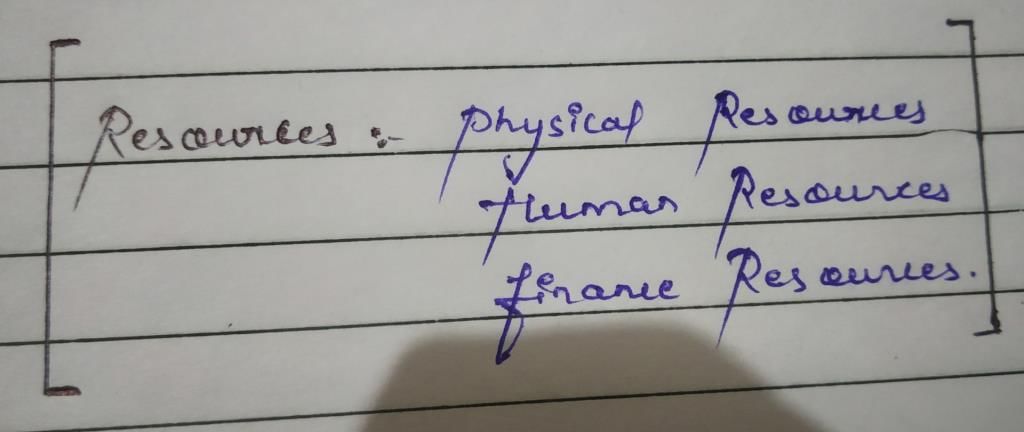 

Three terms in the concept of Management:-
Process:- Process refers to series or sequence of steps.
✓ In management also there are series of functions.
✓ these functions are planning , organising, staffing, directing and controlling .
Effectiveness:- it is concerned with doing the Right task.
✓completing activities On time.
Efficiency :-it refers to do tge task in the right way
✓ Right way means with minimum cost and proper/ optimum utilisation of resources.
✓cost benefit analysis is done.
Difference between effectiveness and efficiency
Conclusion
Effectiveness and efficiency are equally important as both are two sides of a same.
One without other is of no use .
If an organisation is effective and efficient= success.
If an organisation is ineffective and inefficient = Failure.
Features of Management
Management is a goal- oriented process:-
✓ Each and every organisation is establish to achieve certain Goals.
✓Depending upon the nature of organisation every business has different set of goals.
✓ Management AIMS at achieving organisational objectives.
✓success of management is measured by the extent to which the establish goals are achieved.
Management is all pervasive/(universal):-
✓Management activities are performed in all:-
∆Types :-
~Big-small
~Commercial - noncommercial ~Manufacturing -service
∆ levels:-
~ Top level
~Medium level
~Bottom level
∆ Department :-
~Purchase department
~Sales department
~Human resource department
~Finance department.
✓Concept of management is used in whole world what managers do in one country is same as what is done in another country .how they do it may be quite different.
Management is multidimensional:-
Management has three main dimensions
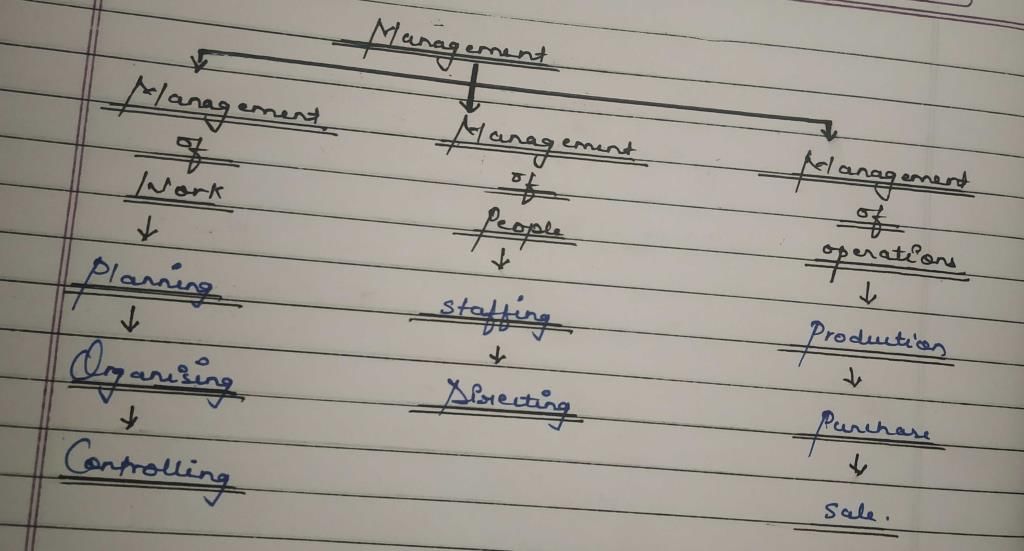
✓ Management of work:-
∆In every organisation certain type of jobs are to be performed .
∆Management ends at achieving goals for task .
✓ Management of people:-
∆ Management aims at getting things done through people .
∆ All employees have different need, personality, background and method of work .
∆Management make them work as a group by giving common direction to their efforts management of people in this sense means reinforcing their strength and eliminating their weakness.
✓ Management of operations:-
∆Every organisation has to provide certain goods or services.
∆their involves process that transformed input into desired output. ∆Management of operation consentrate for mixing Management of works with management of people.
∆Deciding what work has to be done, how it has to be done and who will do it.
Management is a continuous process:-
✓ In consist of series of functions:-
∆Planning
∆Organising
∆Staffing
∆Directing
∆Controlling
✓these functions are performed regularly without any stock .
✓It is a never ending process.
Management is a group activity:-
✓Management consists of a number of persons/ peoples who works as a group .
✓Efforts of all the members are directed towards achievements of goman organisational objectives .
✓Members of an organisation may have different purpose for joining the organisation but an a member they have to initiate, communicate, co-ordinate and join their hands for achievement of organisational goals.
Management is a dynamic function:-
✓Business exist in an ever changing environment .
✓In order to be successful management must change it goals, plans and policies . According to environmental needs .
Management is an intangible force:-
✓Management cannot be seen but it presents can be felt .
✓the presence of management can be felt by seeing the orderliness and co-ordination in the working and environmental of an organisation.
Objectives of Management
Objective:- objective are the ends (purpose/aim) towards which the activities of an organisation are directed.

✓ Organisational objective:- they are the main objective required to fulfill the economic Goals of any business .
The aims is to ultilised resources in most profitable way.
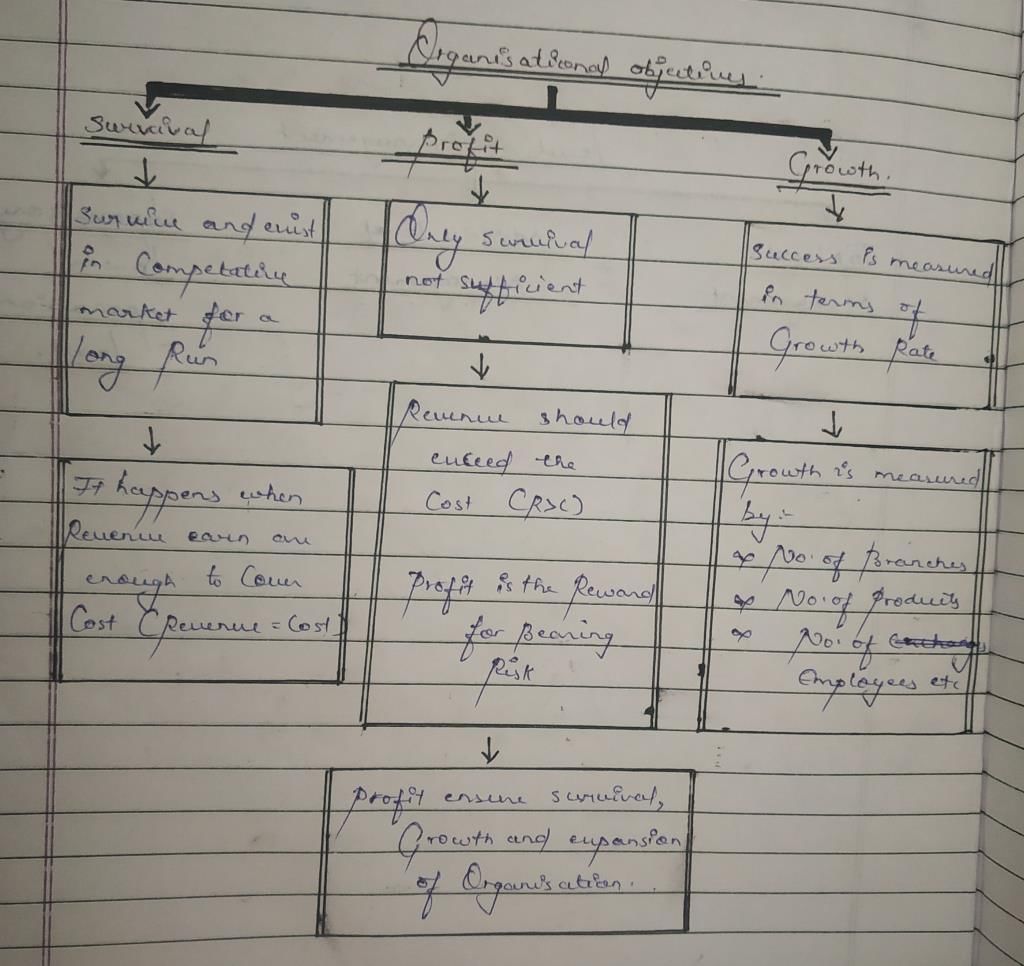
Social objectives:- every organisation is a part of the society. They used of the society, so it has an obligation towards the society.
Main social objectives are:-
✓Using environmental friendly methods of production.
✓Giving employment opportunities to disadvantage section of society.
✓ Supply of quality goods and services at reason able cost.
✓Participating actively in social service project of government and NGOs.
✓ Providing financial support to society by donating for noble causes.
Personal objectives (individual):- Individual objectives are related to the employees of an organisation. As employees are most important resources of every company. A satisfied and motivated employees contribute maximum to the organisation. it includes :-
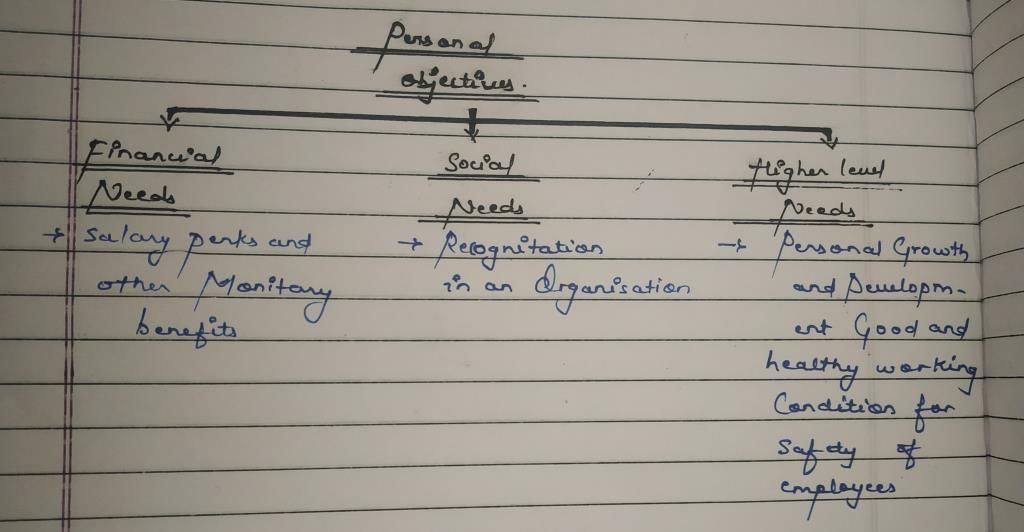
Importance of Management:- "Management it is the life giving element in every business without ate the resources of production remain resources and shall never become production":- Peter Drucker.
Management helps in achieving group goals:- An organisation consists of number of person who worked as a group. Management helps in achieving group goals by giving a common direction to individual efforts for example employees objective:- to earn maximum wages organisation objective to maximize output . Under Peace wage system, wages of a worker is depending upon number of units produced as a result every worker will strike to produce more which indirectly fulfill organisation objective.
Management helps in achieving personal objectives:- with the help of self motivation and leadership techniques, Management helps individual to develop sprit of corporation, commitment etc. A manager motivate his team in such manner that individual members are able to achieve personal goal while contributing to the overall organisation objective.
Management increase efficiency:- efficiency means to produce more output with same level of input or to use less input for the same level of output . through management function of POSDC( planning organising staffing directing controlling) organisation aims to achieve efficiency by using fewer resources, more benefit ,reduction of wastage.
Management creates a dynamic organisation:- the environment in which an organisation work change continuously. it is a tendency of human to resist change because they don't want to move from family and Secure environment to a new environment . In order to be successful an organisation must change itself and its goals according to the needs of the environment .
Management helps in the development of society :-efficient management has multiple objective, social objectives being one of them. fulfilling all the objectives helps in growth and development of the organisation as well as society.
Nature of Management

Management as an art:-
✓Art requires application of personal skills and the knowledge to achieve the desired results.
✓ it involves continues practise and creativity it can be attained with the help of study observation and experienced.
Features of art
∆ Existence of theoretical knowledge:- Every art includes systematic and organized studies material to acquire theoretical knowledge.
~ the various area if management like marketing sales, finance, Human resource etc .Involves a lot of literature .
~ thus, there is an existence of theoretical knowledge . So , this feature of art is present in management also.
∆ Personalised application:- in art theoretical knowledge is not enough .
~ Every Artist must have personal skills and creativity to apply that knowledge.
~ In Management also all managers learn same management theories and principles . But their efficiency depends on how well they used these under diiferent situation by applying personal skills and creativity.
This feature is also present in management.
∆ Based on practice and creativity:- Artist required regular of art become more fine and perfect.
~without practice artist loose their perfection.
~ art required creative practice:- artistnmust add his creativity to the theoretical knowledge he has learn .
~ with experience manager also improve their managerial skills and efficiency.
This feature of art is also present in management.
Management as a science:- science can be defined as a systematic and organized body of knowledge based on facts and finding.
✓ Science comprise of exect principles Which can be verified and it can establish cause and effect relationship .
Main features of science are:-
∆ Systematic body of knowledge:- systematic and organized body of knowledge is available in science.
~ in management also systematic and organized studied material is available.
So 1st feature of science is also present in management.
∆ Principle are baised on experimentation:- scientific principles have been developed through observation and experimentation under control condition.
~ Principle of management have also been developed over a period of time on the basis of experimentation and observations in different types of organisation.
~ But Management deals with Human beings and human behaviour hence the result of these experiments are not so exect.
This feature of science is particialy present in management.
∆ Universal validity:- the principle of science are universal applicable i.e, these principle hold true under each and every situation.
~ the principle of management are not universal applicable. Because they have to be modified according to the situation.
This feature of science is not present in management.
Q:- why management called in exact/soft / social science ?
Ans:- ∆ It is difficult to established cause and effect relationship in management.
∆ situation factors affect the application of management principle.
∆ Management deals with Human beings whose behaviour is very difficult to predict acqurately.
∆ Many of the principle of management are not the outcome of research.
Q:- Management as an art and science conclusion.
Ans:- ∆ Management has features of both art and science .
∆ the practice of management is an art.
∆ the practice of management is based on certain principle , then management can also be considered as science.
∆ science teacher's to know and art to do .
∆ Art without science has no direction and science with art leads to wastage of knowledge.
∆ art is descriptive and science is prescriptive .
∆ so both management has art and science do not contrast each other but complement each other.
Management as a profession :- profession can be defined as an occupation backed by specialised knowledge and training in which entry is restricted.
Main features of profession
∆ Well defined body of knowledge :-In every profession there is practise of systematic body of knowledge. In case management also there is availablity of systematic body of knowledge. There are large number of books available on management studies .
So presently this feature of profession is present in management also.
∆ Restricted entry:- the entry of profession is restricted through an examination or a degree . whereas there is no legal restriction on appointment of a manager, anyone can become a manager irrespective of educational qualification.
So, presently this feature of profession is not present in management but Very soon it will be included with Statutory backing.
∆ Presence of professional association:- For all the professions special association are established and Every professional has to get himself registered with his association. In case of Management Various Management association are set up which have some memberships rules and setup of ethical codes for example AIMA (All India Management Association ). But legally it is not compulsory for managers to became a part of this organisation by registration. So presently this feature of profession is not presented in management but very soon it will be included with statutory backing .
∆ Existence of ethical code:- for every profession there are set of ethical codes fixed by professional organisations and are binding on all the professional of that profession. In case of management 'AIMS ' has deviced a code of conduct for all Indian Management. But legally it is not compulsory for all managers to get register with a AIMA ( all India Management association )and follow their ethical codes .
so this feature of profession is not present in management but very soon it will be included with statutory backing ∆Service motive:- the basic motive of every profession it is to serve the client with dedication whereas basic purpose of management is achievement of Management Goals . But now a days only profit maximization cannot be sole goal of an organisation to survive in market for a long time a businessman must give due to importance to social objective also.
So , presently this feature of profession is not present in management but very soon it will be included with statutory backing.
Management is on the path of becoming a profession
Levels of Management: Top, Middle and Operational Levels
“Levels of management” means different categories of managers, the lowest to the highest on the basis of their relative responsibilities, authority and status.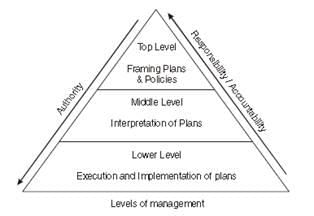 Top Level
Top Level
Consists of Chairperson, Chief Executive Officer, Chief Operating Officer or equivalent and their team.
Chief task is to integrate and to coordinate the various activities of the business, framing policies, formulating organizational goals & strategies.
Middle Level
Consists of Divisional or Departmental heads, Plant Superintendents and Operation Managers etc.
Main tasks are to interpret the policies of the top management to ensure the availability of resources to implement policies, to coordinate all activities, ensure availability of necessary personnel & assign duties and responsibilities to them.
Lower Level/Supervisory Level
Consists of Foremen and supervisor etc. Main task is to ensure actual implementation of the policies as per directions, bring workers’ grievances before the management & maintain discipline among the workers.
Functions of Management
1.Planning: Thinking in advance what to do, when to do, and who is going to do it. It bridges the gap between where we are and where we want to reach.
2.Organising: organization means deciding the framework of working how many units and sub-units are needed,how many posts are needed, how to distribute the authority and responsibilities.
3. Staffing: It refers to recruitment, selection, training, development and appointment of the employees. 4.Directing: It refers to guiding, instructing, inspiring and motivating the employees.
5.Controlling are the main functions of management.Controlling is monitoring the organizational performance towards the attainment of the organizational goals.
Coordination (The Essence of Management):
Coordination is the force which synchronizes all the functions of management and activities of different departments. Lack of coordination results in overlapping, duplication, delays and chaos. It is concerned with all the three levels of management as if all the levels of management are looked at together, they become a group and as in the case of every group, they also require coordination among themselves. So, it is not a separate function of management, rather it is the essence of management.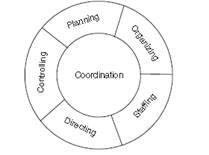 l. Coordination integrates group efforts: It integrates diverse business activities into purposeful group activity ensuring that all people work in one direction to achieve organizational goals.
l. Coordination integrates group efforts: It integrates diverse business activities into purposeful group activity ensuring that all people work in one direction to achieve organizational goals.
2. Coordination ensures unity of action: It directs the activities of different departments and employees towards achievement of common goals and brings unity in individual efforts.
3. Coordination is a continuous process: It is not a specific activity matter it is required at all levels, in all departments till the organization continues its operations.
4. Coordination is all pervasive function: It is universal in nature. It synchronizes the activities of all levels and departments as they are interdependent to maintain organizational balance.
5. Coordination is the responsibility of all managers: It is equally important at all the three-top, middle and lower levels of management. Thus it is the responsibility of all managers that they make efforts to establish coordination.
6. Coordination is a deliberate function: Coordination is never established by itself rather it is a conscious effort on the part of every manager. Cooperation is voluntary effort of employees to help one another. Effective coordination cannot be achieved without cooperation of group members.
FAQs on Business studies notes chapter 1 class 12 - CBSE/Schools
| 1. What is the importance of studying business studies in class 12 CBSE/Schools? |  |
| 2. How can studying business studies in class 12 CBSE/Schools benefit me in the long run? |  |
| 3. What are the different topics covered in the business studies syllabus for class 12 CBSE/Schools? |  |
| 4. How can I effectively prepare for the class 12 CBSE Business Studies exam? |  |
| 5. Are there any career options specifically related to business studies after class 12 CBSE/Schools? |  |
















